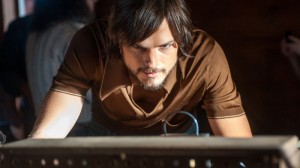Ashton Kutcher talks about becoming ‘Jobs’

This film image released by Open Road Films shows Ashton Kutcher as Steve Jobs in a scene from “Jobs.” AP Photo/Open Road Films, Glen Wilson
LOS ANGELES — It’s clear from Ashton Kutcher’s tone — even though he’s siting 2,500 miles away in New York — that the 35-year-old actor and technology enthusiast holds an unflinching reverence for Steve Jobs, the Apple co-founder he portrays in the film “Jobs,” opening Friday.
When he speaks about embodying the notoriously demanding Mac mastermind during a recent video conversation on Skype, in which Kutcher was an early investor, he’s resolute and thoughtful. It’s the antithesis of his goofball on-screen personas in TV series like “That ’70s Show” and “Two and a Half Men” and in films such as “Dude, Where’s My Car?” and “What Happens in Vegas.”
For Kutcher, he says it was imperative that he personify, not parody, the well-documented mannerisms of Jobs, who died in 2011 of pancreatic cancer and will also be profiled in an untitled Sony film by Aaron Sorkin. Apple co-founder Steve Wozniak, who’s played by Josh Gad in “Jobs,” has been hired as an adviser on the upcoming Sorkin film.
With “Jobs,” Kutcher hopes his performance is as much a lesson about entrepreneurship to today’s youth as it a profile of a man who revolutionized technology.
AP: You don’t paint a spotless portrait of Steve Jobs in this film. How did you balance playing a man that’s obviously an icon but also has flaws like everyone else?
Kutcher: I think Steve cared about the end result and wasn’t worried about being liked and knew he would eventually be liked if his creations were properly executed. He was very blunt, but it’s because he cared. I tried to look at his faults as his gifts, and I tried to understand it and not judge it. I think the way that guy received love in life was by creating products that people loved, and when they loved the products, they thereby loved him.
AP: How did you mentally prepare for the scenes where Jobs goes into beast mode and he’s yelling and combative?
Kutcher: He was never just senselessly combative. I think there was something he desired, and he had a goal and passion for his consumers that were driving his frustration. He wanted the people around him to care as much about the result as he did. I think his frustration was in an effort to motivate people to care.
AP: Why do you think now is the right time for this story? It isn’t too soon?
Kutcher: As time passes, I think the tales get taller. He’ll become more glorified for the things he did right, and more vilified for the things he did wrong. We had a great opportunity to tell a story about a guy with an exponential amount of resources to inform us about what really happened — or as close to what really happened as they can recall.
AP: How do you feel about Steve Wozniak declaring some scenes weren’t accurate after he saw footage of the film?
Kutcher: Steve Wozniak is being paid by another company to support their Steve Jobs film. It’s personal for him, but it’s also business. We have to keep that in mind. He was also extremely unavailable to us when producing this film. He’s a brilliant man and I respect his work, but he wasn’t available to us as a resource, so his account isn’t going to be our account because we don’t know exactly what it was. We did the best job we could. Nobody really knows what happened in the rooms.